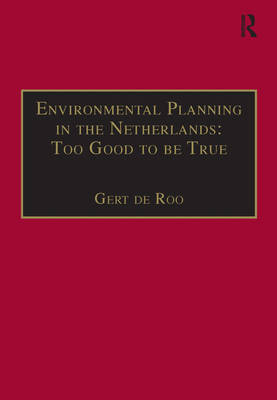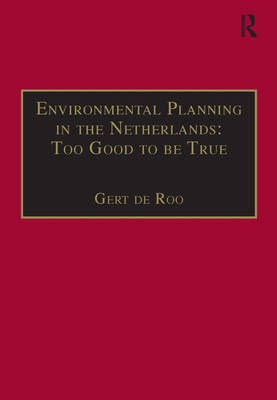
- Afhalen na 1 uur in een winkel met voorraad
- Gratis thuislevering in België vanaf € 30
- Ruim aanbod met 7 miljoen producten
- Afhalen na 1 uur in een winkel met voorraad
- Gratis thuislevering in België vanaf € 30
- Ruim aanbod met 7 miljoen producten
Zoeken
Environmental Planning in the Netherlands: Too Good to Be True
From Command-And-Control Planning to Shared Governance
Gert De Roo
€ 182,45
+ 364 punten
Uitvoering
Omschrijving
The Netherlands is one of the most prominent and innovative countries in the field of environmental planning. Over the past decade, its government has introduced such ground-breaking schemes as Integrated Environmental Zoning, the City-Environment Project, the Bubble Concept and Policy Concepts and new approaches to coping with noise, odours, soil pollution, air pollution and safety issues. These initiatives and policy tools reflect a rapidly changing and decentralising environmental policy, which contrasts with more conventional environmental ideologies. However, at present little is known of these policies in the international arena. De Roo shows how and why, in recent years, the country's planning system has moved away from its traditional 'top-down' structure. The resulting changes have had far-reaching consequences for the traditional principles of Dutch environmental policy. In addition, measures for compensating excessive environmental loads are now open to discussion and environmental quality is a subject of negotiation among stakeholders. All these developments mean that environmental policy-making has become more closely integrated with local initiatives that focus on general location-specific qualities. In this book, this development is referred to as 'tailor-made comprehensive planning', which relates closely to the local context, is area-specific, situation-dependent, and embraces shared governance.
Specificaties
Betrokkenen
- Auteur(s):
- Uitgeverij:
Inhoud
- Aantal bladzijden:
- 408
- Taal:
- Engels
- Reeks:
Eigenschappen
- Productcode (EAN):
- 9780754638452
- Verschijningsdatum:
- 28/11/2003
- Uitvoering:
- Hardcover
- Formaat:
- Genaaid
- Afmetingen:
- 152 mm x 218 mm
- Gewicht:
- 635 g

Alleen bij Standaard Boekhandel
+ 364 punten op je klantenkaart van Standaard Boekhandel
Beoordelingen
We publiceren alleen reviews die voldoen aan de voorwaarden voor reviews. Bekijk onze voorwaarden voor reviews.











